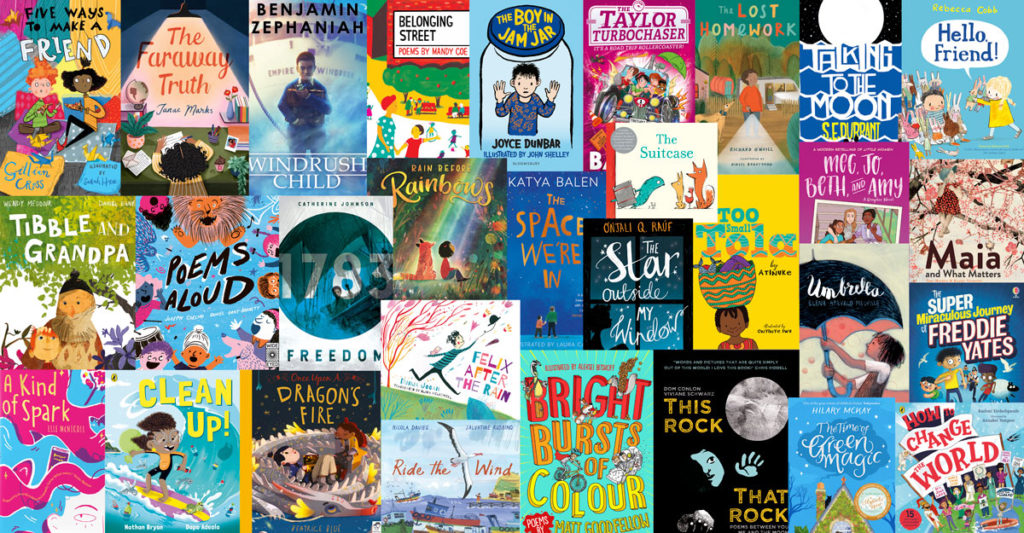The ReadforEmpathy Book Collections from @EmpathyLabUK feature 50 superb books.
Some illuminate the experience of people from a range of cultures or life circumstances.
Others help children explore emotions, so they can understand how other people feel.
Several reflect stories of our time, such as the refugee experience, or coping with anxiety.
All are engaging and thought provoking.
Each collection has its own Read for Empathy Guide with a synopsis of all of the books, top tips for sharing stories and more information about Empathy Day which is on 10 June 2021.
Find out more about the primary booklist here.
Q&A with Miranda McKearney
Founder of EmpathyLab

What’s the difference between empathy and kindness?
Empathy is not the same as kindness or sympathy. The difference is sometimes described as “feeling with” (empathy) as opposed to “feeling for” (kindness or sympathy). Kindness is one of the ways empathy might be put into action, whereas empathy requires a deeper emotional connection. Empathy is seeing through someone else’s eyes or stepping into someone else’s shoes – defined as experiencing how someone else is feeling.
Why are these important skills for children to master, both for now and in the future?
Empathy is at the heart of being able to relate well to others – so it underpins our ability to be a good friend, parent, workmate and citizen. It’s an essential life skill, not a soft skill. At school, empathy is crucial because relationships underpin the feeling of emotional safety children need in order to be able to learn effectively.
Why do some primary school children find kindness and empathy difficult?
They have never seen it modelled. They might have experienced trauma. They might not have the language to talk about feelings on a deeper level. Contemporary society is very focused on individual success with less emphasis on collective understanding.
What role do parents play in teaching children empathy?
They need to model it and that begins by listening well. Help children understand their own emotions and use vocabulary for feelings around the home. Use the Read for Empathy collections to share the books at home and really talk about them – there’s something for all ages!
What role do schools play?
Schools are pivotal – especially for children whose homelife has not benefitted from the influence of a steady, empathetic adult. The schools EmpathyLab work with incorporate empathy into their School Development Plan, developing a whole school language, subtly shifting pedagogy so empathy education is woven into English teaching, PHSE and whole school activities. Educators – come to one of our training sessions!
How can books help children develop empathy and kindness?
Books help children tune into feelings to experience other lives and other points of view at a safe distance. They are comparable to a flight simulator.
What should parents do if they catch their child being unkind – whether that’s to siblings, classmates, etc?
Listen to what the feelings are behind it. Discuss alternative responses.
Could you suggest some everyday ways to teach children to be kind and empathic, at home, at school and in the wider world?
READ: A double win because its reinforcing empathy and literacy skills! Use EmpathyLab’s Read for Empathy Collections of specially curated books.
JOIN IN: Name and reinforce children’s empathic behaviours. Plan a special Empathy Day to really focus on this human superpower. A nationwide Empathy Day falls in June every year and there are free resources and ideas of how to join in or create your own Empathy Day at https://www.empathylab.uk/.
VALUE: Show you value empathy and caring above achievement. It’s a skill you can develop, value the effort, and help children recap. Expect children to help those in need. Talk about people who help others as heroes, not celebrities. Encourage courage – help children not be bystanders.
VISIT: Visit a night shelter or other local social support venue to help children understand what’s happening in their local area. Go beyond fundraising and show solidarity. Learn about refugees and asylum seekers using a pack like Amnesty International’s Seeking Safety and get children to write letters to refugees to show their solidarity
———————
For more information and free guides, visit https://www.booksfortopics.com/empathy-books.
Where next?
> Visit our Reading for Pleasure Hub
> Browse our Topic Booklists
> View our printable year group booklists.
> See our Books of the Month.









